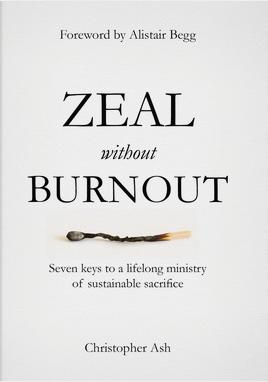Zeal Without Burnout
Christopher Ash
The Good Book Company 2016
One infamous quote on burnout comes from the 19th century Scottish Presbyterian minister Robert Murray M’Cheyne—of the bible in a year reading plan—who wrote of his impending death from typhus: “God gave me a message to deliver and a horse to ride. Alas, I have killed the horse and now I cannot deliver the message.”
While M’Cheyne’s metaphorical aphorism may appear dated, the experience of burnout is far from past. Christopher Ash’s short book draws from a range of personal engagements and examples, including his own experiences of twice coming “to the edge of burnout” (15).
The book is punctuated throughout by interviews, vignettes, and personal stories of burnout experiences— including that of Peter Adam.
Ash helpfully starts the book by addressing the burnout elephant in the Christian ministry room: the mis-construal of burnout as a sacrifice for Jesus, hinted at in aphorisms such as George Whitefield’s “I would rather wear out than rust out” (24). In response he suggests that there is a “partial parallel between burnout and self-harm … [in that] each damages strength and life to no good effect.”
The aim then is not to flee from sacrifice—for we are called to costly sacrifice (Rom 12:1)—but rather to engage in what Ash describes as “sustainable sacrifice … the sort of self-giving living that God enables us to go on giving day after day” (26).
In response to the elephant Ash reminds the reader that we are but creatures of dust, embodied, finite, and limited beings in comparison to our creator. Yet our own human predilections tend to blind us to that reality, preferring— in our strength—to “believe that we are something other than dust” (37), contingent on the animation of God’s breath in us. Indeed, as it was this delusion that was shattered on a societal level by the sudden spread of COVID, should there be any surprise that we have such high levels of burnout in the post-COVID landscape?
Ash’s solution re-centres us as God’s creatures, dependent on Him, and importantly with our finitude and frailties known by Him.
From this basis Ash suggests seven “keys” of sustainable sacrifice. The first four come in the form of our own finitude, and form foils to God’s infinitude: Sleep, Sabbath, Friends (peers and fellow workers), and Food (renewal and sustenance). While each seems relatively straight forward, Ash deftly walks through each topic with a biblical guide to our own frailty, looking for God’s sustenance at each point. Suitably this focuses our attention on God’s love for us, rather than our own self-reliance.
Each chapter ends with some practical actions for the reader, and stories from those who have gone before us into burnout.
The final three keys are less attributes, as they are to do with temptations. The first addresses the celebrity culture of the modern church—of which there is no shortage of examples for how this has gone wrong. The second is a broad encouragement—and an encouragement to encourage others. Too often ministry can be seen as a competitive sport, and Ash defuses that mentality here.
The final key is a continual rejoicing in God’s grace, rather than gifts. Having joy in God’s grace as the motivator to ministry is the key here—drawing from J.C. Ryle. The book is rounded out by an extremely helpful appendix on a clinical approach to defining burnout from Dr Steve Midgley, a trained psychiatrist and Church of England minister. This chapter is worth the price of the book on its own and is invaluable at taking a self-assessment or giving to others.
Overall, the book is mercifully short for those who want
something to bite into quickly—and let’s face it, most people who are at risk of burnout will benefit from a shorter work—yet is deep enough to sustain. Highly recommended for anyone in Christian ministry— volunteer, lay, or ordained—and best read before any signs of burnout.
Chris Porter is the Post-Doctoral Research Fellow at Trinity College Theological School, Melbourne
